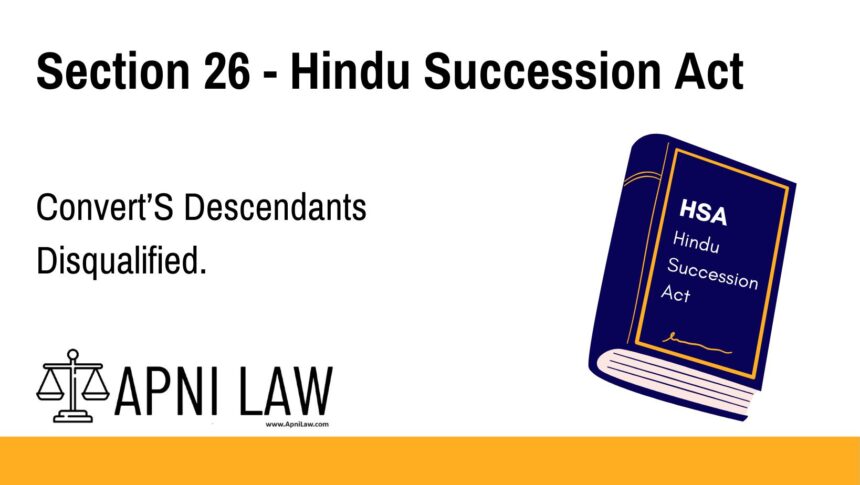Code: Section 26 – Convert’s Descendants Disqualified
Where, before or after the commencement of this Act, a Hindu has ceased or ceases to be a Hindu by conversion to another religion, children born to him or her after such conversion and their descendants shall be disqualified from inheriting the property of any of their Hindu relatives, unless such children or descendants are Hindus at the time when the succession opens.
Explanation of Section 26 of the Hindu Succession Act
Section 26 of the Hindu Succession Act, 1956 addresses the inheritance rights of descendants of a converted Hindu. If a Hindu converts to another religion—such as Christianity, Islam, or Judaism—the children born to them after the conversion, and their subsequent descendants, are generally disqualified from inheriting property from Hindu relatives.
However, this disqualification is conditional. The key point is: if such children or descendants are Hindus at the time the succession opens (i.e., at the time of the relative’s death), they can inherit.
🔍 Important Distinctions:
- The person who converts is not disqualified under this section.
- Only children born after the conversion (and their lineal descendants) are disqualified.
- The disqualification can be avoided if the child or descendant reconverts to Hinduism before the succession opens.
This provision is based on the principle that succession under Hindu law is only meant for those who continue to follow the Hindu faith.
Illustration
Example 1: Converted Hindu’s Children Disqualified
A Hindu woman converts to Christianity. She later has a son. That son is not a Hindu. When her Hindu father (the child’s grandfather) dies intestate, the son cannot inherit his grandfather’s property.
Example 2: Reconversion Allows Inheritance
Same situation as above, but the son reconverts to Hinduism before the grandfather’s death. Since he is a Hindu when the succession opens, he is eligible to inherit under Section 26.
Common Questions and Answers on Section 26 Hindu Succession Act
1. Who is disqualified under Section 26?
Only the children born after a Hindu converts to another religion (and their descendants) are disqualified from inheriting property from Hindu relatives.
2. Is the person who converts disqualified?
No. The person who ceases to be a Hindu is not automatically disqualified from inheriting under this section. Their personal disqualification is dealt with under other provisions (see Section 25).
3. Can the disqualification be removed?
Yes. If the child or descendant becomes a Hindu again (i.e., reconverts) before the inheritance opens, they are eligible to inherit.
4. What if the child was born before the parent converted?
Children born before conversion are not affected by Section 26. Only those born after conversion are considered under this provision.
5. Does this apply to Buddhists, Jains, and Sikhs?
Yes. The Hindu Succession Act applies to Hindus, including Buddhists, Jains, and Sikhs, and Section 26 is equally applicable in those contexts.
Conclusion
Section 26 of the Hindu Succession Act protects the religious continuity of Hindu family succession. It disqualifies only those descendants who are born to converted individuals and who do not follow the Hindu faith at the time of succession. This ensures that inheritance under Hindu law remains within the community, while still offering a route to inheritance through reconversion.
For more detailed articles on succession rights and disqualifications under Hindu law, visit ApniLaw — your trusted guide to simplified legal knowledge.








